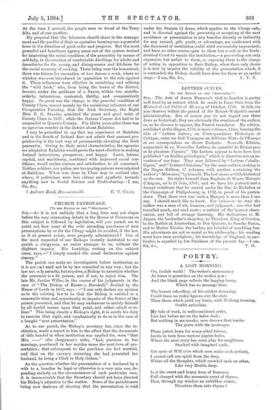CHURCH PATRONAGE.
[TO THE EDITOR OF THE " SPECTATOR." I
SIE,—As it is not unlikely that a long time may yet elapse before the very interesting debate in the House of Commons on this subject is followed by legislation, will you permit me to point out how some of the evils attending purchases of next presentations by or for the Clergy might be avoided, if the law, as it at present exists, were properly administered ? One of the most respected of our Bishops recently instituted to our parish a clergyman, an entire stranger to us, without the slightest inquiry. His Lordship, writing on the subject since, says,—" I simply exacted the usual declaration against simony."
The parish can make no investigation before institution, as it is not and need not be by law consulted in any way ; but the law not only permits, but requires, a Bishop to ascertain whether the presentee is a fit person, and if not, to reject him. The late Mr. Justice Willes, in the course of his judgments in the case of " The Bishop of Exeter v. Marshall," decided by the House of Lords in 1867, says :—" I can only declare my opinion as to the existing law to be that the Bishop is entitled to a reasonable time and opportunity to inquire of the fitness of the -person presented, and that he may endeavour to satisfy himself by all lawful 'means upon that point, and either admit or re- fuse." This being clearly a Bishop's right, it is surely his duty to exercise that right, and emphatically to do so in the case of a bought " next presentation."
As to our parish, the Bishop's secretary has, since the in- stitution, made a report to him to the effect that the documents of title handed in when institution was applied for, were " that Mrs. —" (the clergyman's wife), "had, previous to her marriage, purchased in her maiden name the next turn of pre- sentation ; that subsequent to the purchase she had married, and that on the vacancy occurring she had presented her husband, he being a Clerk in Holy Orders."
As the question whether the presentation of a husband by a wife to a benefice be legal or otherwise is a very nice one, de- pending entirely on the circumstances of each particular case, it is inconceivable that the Secretary should not have directed his Bishop's attention to the matter. Some of the parishioners being now desirous of showing that the presentation is void under the Statute 12 Anne, which applies to the Clergy only, and is directed against the procuring or accepting of the next avoidance or presentation to any benefice directly or indirectly for any reward, gift, profit, or advantage, are confronted with the document of institution (valid until successfully impeached), and have no other course open to them but a suit in the Eccle- siastical Court to vacate the institution,—a proceeding not only expensive, but unfair to them, as exposing them to the charge of acting in opposition to their Bishop, when their only desire is to test by inquiry the validity of the presentation which, it is contended, the Bishop should have done for them at an earlier










































 Previous page
Previous page